Zubaidat: Maintaining primary care provision during COVID-19
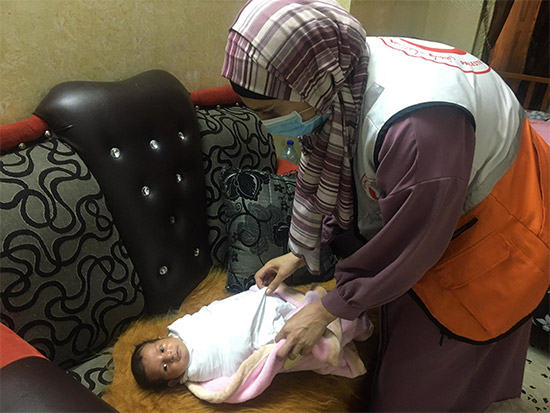 5 May 0201 - 33-year-old Amani is a mother of three and nurse who works with a mobile clinic team of the Palestine Red Crescent Society (PRCS). She has been working with the team for the past four years, providing primary care services to underserved and remote Palestinian communities in Area C, which comprises approximately 60% of the West Bank that remains under Israeli civil and military control. The area has been the focus of Israeli settlement expansion, with accompanying severe restrictions on Palestinian development of infrastructure. Restrictions affect the development of permanent or semi-permanent health facilities, placing dependence on mobile clinic teams for provision of essential health services. However, access can be unpredictable and precarious, a situation that has been exacerbated during the COVID-19 pandemic.
5 May 0201 - 33-year-old Amani is a mother of three and nurse who works with a mobile clinic team of the Palestine Red Crescent Society (PRCS). She has been working with the team for the past four years, providing primary care services to underserved and remote Palestinian communities in Area C, which comprises approximately 60% of the West Bank that remains under Israeli civil and military control. The area has been the focus of Israeli settlement expansion, with accompanying severe restrictions on Palestinian development of infrastructure. Restrictions affect the development of permanent or semi-permanent health facilities, placing dependence on mobile clinic teams for provision of essential health services. However, access can be unpredictable and precarious, a situation that has been exacerbated during the COVID-19 pandemic.
One of the communities served by the PRCS mobile clinic that Amani works for is Az-Zubaidat village in the Jericho governorate of the central Jordan Valley. The community experienced an outbreak of COVID-19 in September 2020, but the clinic continued to provide its essential services.
Amani stated, “It’s true we were extremely scared, but our fear didn’t prevent us from providing our service to the fullest extent. People in the community were very thankful to us for the effort. They felt they were not alone during this time, and we were the only organisation in the area able to maintain our services. To this day we have continued. The weather in September was really hot. After the visit when we would take off the protective gear and all our clothes would be wet. Still we were happy we provided the service.”
The clinic provides screening services, medical consultations, women’s health services, and women’s education and empowerment activities. Amani is also involved in home visits to women who have just given birth, to carry out check-ups on mother and baby. During COVID-19, the clinic provided additional services including health promotion and awareness, provision of hygiene kits, and COVID-19 screening services. The team would answer the questions of community member and explain to them the symptoms of COVID-19 and where to seek assistance or medical help.
A difficulty of health care provision during this period has been the stigma towards health care workers, including comments Amani endured from other colleagues and family members for continuing to visit affected areas. “When other colleagues would come to the mobile clinic office, they would automatically wear their mask before coming close to us. They kept telling us to be careful as they were worried. Distant family also commented about my work as they were scared I would bring the virus home.”
With restrictions of movement and closure of schools many working mothers were asked to take days off to be able to spend time with their children. Amani wasn’t able to take a single day of annual leave during 2020 and spent all her time providing support to families served by the clinic. While she was at work, Amani’s family, including her aunts and grandparents, helped with childcare.
“People know about the Palestine Red Crescent Society and the services we provide. We didn’t stop visiting our communities for a single day. When you provide a service and see people’s appreciation for your work, you realize it is important and you forget your fears. You want to help more. I knew that these people needed our help, and we were the only organisation able to visit them during that time.”
Primary care provision at Humsa following mass demolitions
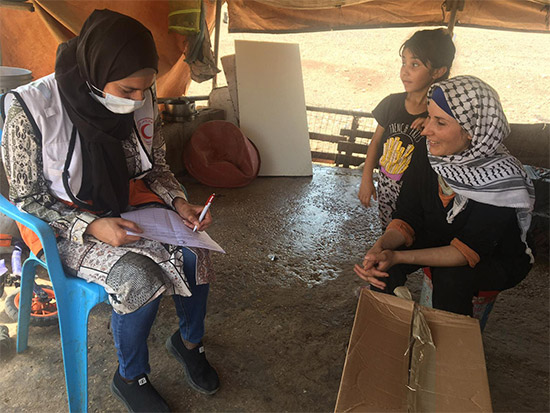 30 April 2021 - Humsa is a collection of Bedouin communities comprising around 175 people, in the north Jordan Valley in the West Bank.
30 April 2021 - Humsa is a collection of Bedouin communities comprising around 175 people, in the north Jordan Valley in the West Bank.
Two major incidents of demolitions by Israeli forces at Humsa Al Bqai’a occurred in February 2021, where 60 people including 35 children were left displaced and at risk of forcible transfer. The community was provided tents, kitchen utensils and other essential support by humanitarian agencies. The Palestine Red Crescent Society (PRCS) outreach team was approached by the community after the demolitions took place and has since been visiting the community to provide primary health care and women health services, along with medicines, hygiene kits, food parcels and tents to individuals and families. The mobile clinic team comprises a doctor, nurse, social worker, and driver.
The communities of Humsa are remote and in areas designated as firing zones by Israeli forces. Road access is difficult, made more hazardous by the wet conditions during the early visits in winter. There are several kilometres between each community. The nearest permanent primary health facility is some 12 to 20 km away (depending on the community), with no public transport and few cars available to make the journey.
Afaf is the social worker with the clinic. She commented, “People in this area, especially women, face a lot of pressure and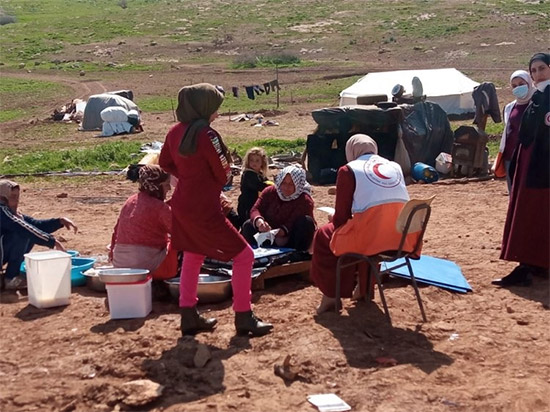 difficulties. Their basic needs are not being met. Women have to cross over hills to bring the water they need.” Afaf provides health promotion and awareness services for the women, focused on areas such as nutrition in pregnancy and child health. “Although we strive to provide health services and support, the difficulties with access for the communities and the severe restrictions on development of infrastructure for basic necessities like water, housing and electricity affect the health of the communities badly. Some families have been divided so that the children can attend schools, which are closer for some communities than others.”
difficulties. Their basic needs are not being met. Women have to cross over hills to bring the water they need.” Afaf provides health promotion and awareness services for the women, focused on areas such as nutrition in pregnancy and child health. “Although we strive to provide health services and support, the difficulties with access for the communities and the severe restrictions on development of infrastructure for basic necessities like water, housing and electricity affect the health of the communities badly. Some families have been divided so that the children can attend schools, which are closer for some communities than others.”
Humsa Al Bqai’a has been subject to four mass demolitions/confiscations since 2014, affecting homes as well as structures for water, hygiene, sanitation, and agriculture. Demolitions and restricted planning in Area C of the West Bank impact on community health by affecting access to affordable clean water, and in turn livelihoods, poverty, and food security. Rural Palestinian communities in the Jordan Valley experience higher rates of stunting and childhood malnutrition. Community mental health meanwhile is affected by the situation of precarity that arise from insecurity of housing and exposure to high levels of violence.
Jana and palliative care in the Gaza Strip
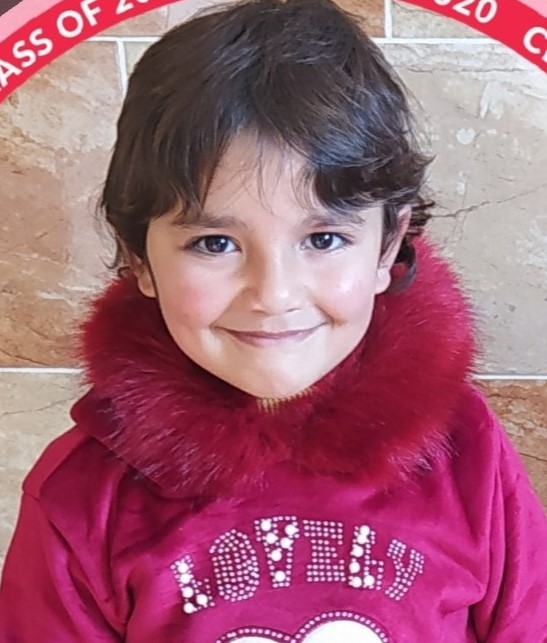 29 April 2021 - Jana is 4 years old from Jabalia, in the north of Gaza City. She was diagnosed with cancer in 2018 and underwent surgery to have a tumour in her bladder removed in January 2019.
29 April 2021 - Jana is 4 years old from Jabalia, in the north of Gaza City. She was diagnosed with cancer in 2018 and underwent surgery to have a tumour in her bladder removed in January 2019.
WHO first met Jana in January 2020, when she had been unable for several months to obtain Israeli-issued permit to access radiotherapy treatment at Augusta Victoria Hospital, located in East Jerusalem, a different part of the occupied Palestinian territory. On 16 February 2020, after a four-month delay in her access, Jana and her mother were able to travel to reach health care outside the Gaza Strip.
The outbreak of COVID-19 occurred in the occupied Palestinian territory on 8 March 2020, with the first cases detected in Bethlehem. Since that date, Jana travelled to East Jerusalem for health care twice. From 16 February to 20 May 2020, she completed a course of chemotherapy and radiotherapy at Augusta Victoria Hospital. Jana returned on 29 June for further investigations, and was discharged on 13 July. Since this time, Jana has been followed up for palliative treatment in the Gaza Strip, although drugs shortages, lack of trained staff, and the demands of the emergency response to COVID-19 have all posed a challenge to her receiving the quality of care that she needs. Dr Mahmoud Shbair, a paediatric oncologist at Rantisi Hospital, commented on some of these challenges: “We often give high doses of morphine and fentanyl to patients with advanced cancer, to try to effectively control their pain. But we often run out of painkillers. We need staff training for palliative care, as well as sufficient drugs and the right equipment.”
Jana’s father told WHO, “Doctors in East Jerusalem told us there was nothing more that could be done for Jana. We went to Rantisi Hospital in Gaza on 24 August for follow up and her doctor there said the same. So, we are taking care of Jana at home. We go to Rantisi Hospital from time to time, but things have become difficult with coronavirus. We try to avoid taking her to hospital.” The systems for palliative care are not well developed in the Gaza Strip, where rates of poverty and unemployment also affect the ability of families to purchase even basic painkillers from private pharmacies.
Palliative care aims to improve quality of life for patients and their families and reduce suffering for persons with life-threatening illnesses, with the integration of physical, psychosocial, and spiritual aspects of patient care. Palliative care is an essential part of the right to the highest attainable standard of health, while palliative care medicines – including those needed for proper relief of pain and suffering – feature in the Essential Drugs Lists of WHO and the Palestinian Ministry of Health.
Dr Bushra Lubad is Head of the Intensive Care Unit in Rantisi Paediatric Hospital in the Gaza Stip. She stated, “Palliative care is needed from the initial point of care, it’s not only for patients in terminal stages of illness. It’s also needed for many conditions, not just cancer. We need to take care of children with kidney failure, cystic fibrosis, neurological, and other chronic diseases from all hospital departments.” Her team comprises two doctors, five nurses, a pharmacist, a psychologist, and a volunteer spiritual therapist. They have worked to strengthen palliative care for their patients in the hospital, but protocols for referral to palliative services are not well established and Dr Lubad points to a need for greater awareness, improved capacities, standard guidelines, and better integration of palliative care across the health system. At Rantisi Hospital, the team serves children who are staying as inpatients only and the service is in its early stages, established since September 2019 and working across different departments. “There is no palliative care department or even a room where a doctor or nurse can receive patients for palliative care consultations. An outpatient clinic for palliative care is still a dream!”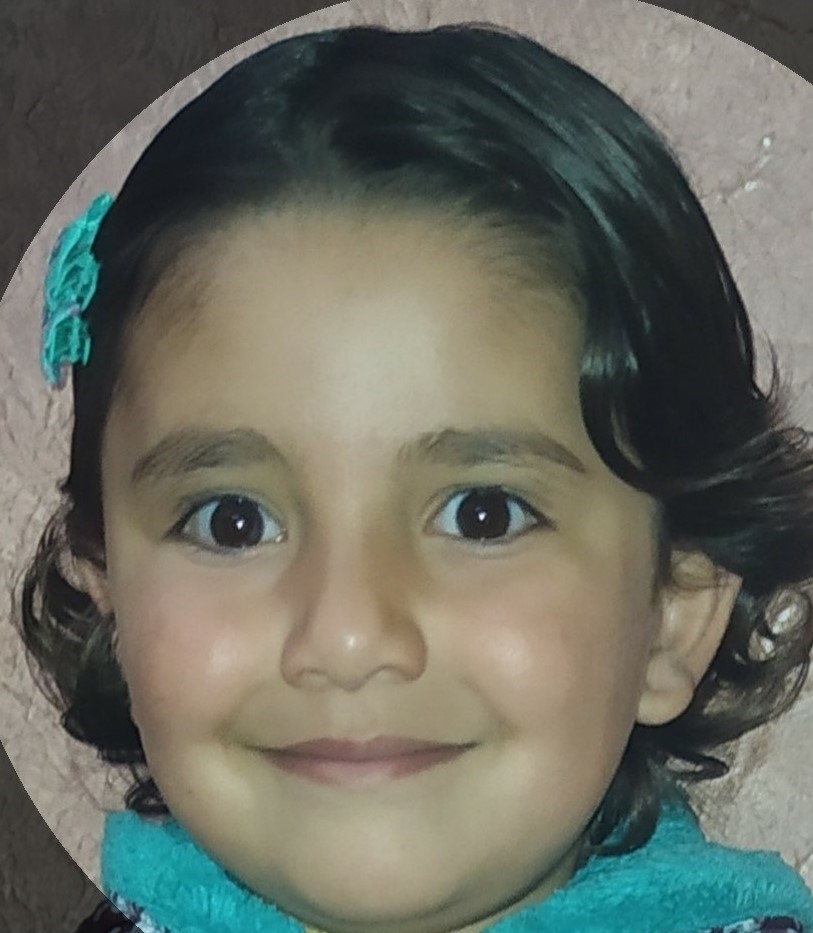
The sole psychologist at Rantisi Hospital often has to function as a social worker as well. She explained, “I talk to patients and their families to try to provide psychological support. However, many of them are facing severe hardship and they really need social interventions and assistance. But I don’t have anywhere to refer them to. Many times, we can’t afford basic materials to keep the children amused, like coloring books, crayons, and paper. I can only see the children staying as inpatients, but these children and families need help outside hospital too. The health staff in the hospital suffer psychologically, and they also need someone to take care of them.”
Jana’s ability to walk and play has become limited due to her illness and these days she gets tired quickly. One of the effects of her cancer is that it can stop her from passing urine, which has been happening once or twice each month in recent times. According to Jana’s father, “When this happens, we take her to Rantisi Hospital or to a private clinic. A nurse who lives near us has also come to help sometimes.” The family buys Jana simple pain relief medicines at the local pharmacy and do not receive psychosocial support at home. They continue to hope for a cure for Jana. Her father added, “If we knew of a place they could cure Jana we would do anything, even sell the house. We keep looking for the possibility of referring her outside for help.”
“I will continue to be an advocate for a better health for all Palestinians’’ reflected Dr Rockenschaub at a farewell event before his departure
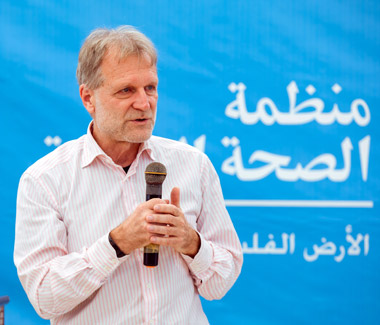 3 March 2021 - "Dr Rockenschaub and the WHO organization and what they represent were not only our partners, but they worked together with high professionalism. His support and efforts to Palestine’s performance facing COVID-19 outbreak showing the highest levels of responsibility," Prime Minister of the Palestinian Authority Dr Mohammad Shtayyeh has recognized the efforts of WHO’s Head of Office, Dr Gerald Rockenschaub, after almost seven years in the position.
3 March 2021 - "Dr Rockenschaub and the WHO organization and what they represent were not only our partners, but they worked together with high professionalism. His support and efforts to Palestine’s performance facing COVID-19 outbreak showing the highest levels of responsibility," Prime Minister of the Palestinian Authority Dr Mohammad Shtayyeh has recognized the efforts of WHO’s Head of Office, Dr Gerald Rockenschaub, after almost seven years in the position.
Dr Shtayyeh joined WHO and UN staff, partners and supporters in the West Bank and Gaza Strip to bid farewell to Dr Rockenschaub in ceremonies in the past weeks before he moved to WHO Albania to take up a similar position.
Dr Walid Nammour, secretary-general of the East Jerusalem Hospitals Network also said, "Dr Gerald has greatly contributed to supporting East Jerusalem Hospitals, especially his support to COVID-19 preparedness and his role in consolidating the Palestinian National Institute of Public Health, in their efforts to build a more resilient health system and to strengthen data collection, and the utilization of evidence and best practice by the Ministry of Health. Gerald had a mission in oPt to achieve and not just a job to follow."
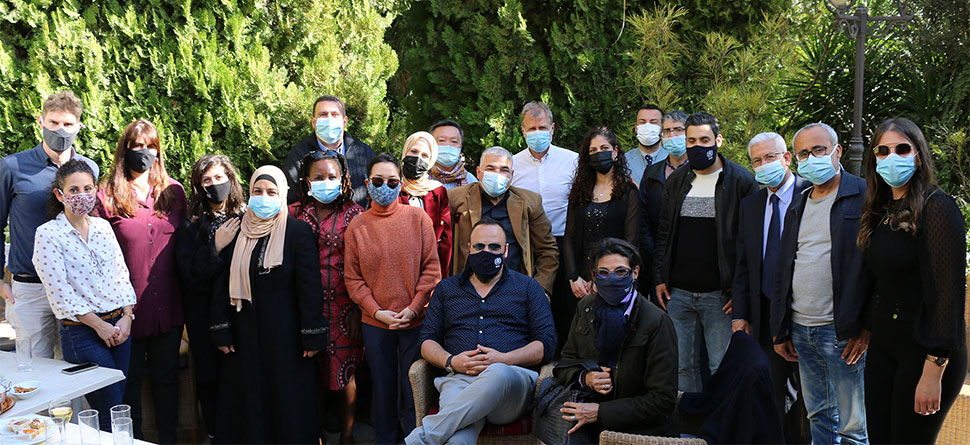
WHO Health Emergencies Team Lead, Dr Ayadil Saparbekov, reflected on his integrity, dedication and legacy, “under his leadership WHO has made a significant contribution to improving the health of Palestinians. WHO supported the Ministry of Health in the COVID-19 response including considerably scaling up the testing capacity of the central drug laboratory in Gaza and being one of the first countries in the Eastern Mediterranean Region to mobilize the COVID-19 vaccine through the COVAX AMC Facility.”
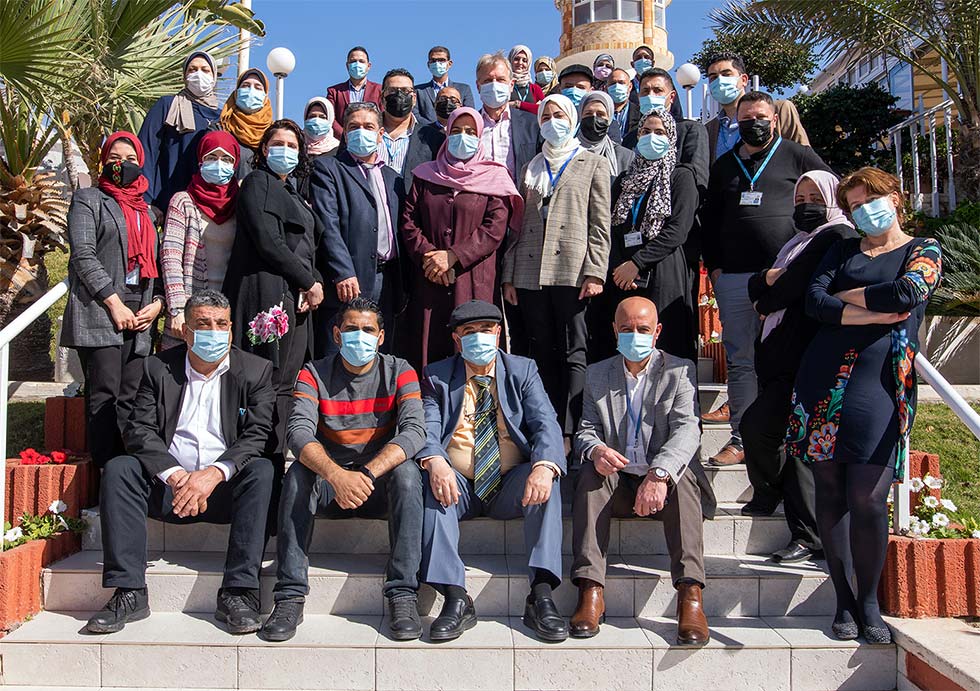
Following the Great March of Return demonstrations in Gaza in 2020, Dr Rockenschaub supported the establishment of a Limb Reconstruction Centre to provide permanent health services to those with gunshot wounds who needed specialized and complex limb surgeries to prevent disabilities and amputations.
“I will continue to be an advocate for a better health for all Palestinians, who experience challenging experiences and difficult situations,’’ reflected Dr Rockenschaub at a farewell event before his departure.








